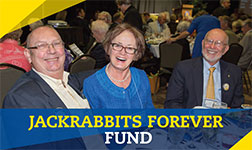In Lakota, wacipi (pronounced wah-CHEE-pee) means “they dance” and is similar in meaning to the term “powwow.” Wacipi is a traditional part of Native American culture and is an opportunity to connect with old friends, meet new ones, preserve a rich heritage and, of course, dance.
After thousands of hours of planning and preparation, South Dakota State University’s 31st annual student-run Wacipi, held April 1 and 2, was a resounding success.
“It went amazing,” said Dallas Kelso, president of SDSU’s American Indian Student Association.
“This is a chance for us to have a celebration for our relatives and embrace our culture.”
Due to construction at Frost Arena, this year’s Wacipi had to find a new home. Kelso and other members of the Wacipi board landed on the University Student Union’s Volstorff Ballroom as the replacement location. Being a significantly smaller space than Frost Arena created a unique set of challenges for the organizers, but the celebration went off without a hitch.
“The smaller venue made it very intimate,” Kelso, a sophomore English education major, said.
The two-day event included multiple grand entries, with all nine South Dakota tribes represented, as well as traditional dancing and music. The host drum band, Bad Nation, is well-known in the Indigenous community. Noella Red Hawk served as the head woman judge while Shane Red Hawk served as the head man judge.
“Seeing all the tribes represented with their flags during the grand entry was incredible,” Kelso, who is a Chadron, Nebraska, native and member of the Oglala Sioux tribe, said.
Tylan Bear, a junior studying architecture, was asked to carry the eagle staff—a sacred symbol used for ceremonial purposes—into the venue during grand entry.
“It truly was an honor to lead the veterans/heroes into the Wacipi Circle,” Bear said. “It was my first Wacipi being asked to do so.”
On Saturday during the celebration, the AISA hosted a free community supper. Members also sold Indian tacos over the course of the two days, and handgames were played throughout the weekend.
The event, which grew from the previous year, was well-attended with thousands of participants and visitors congregating on SDSU’s campus. Next year, Kelso expects attendance numbers to double.
“The turnout was great this year,” Kelso said. “I expect the Wacipi to continue to grow.”
This year’s Wacipi theme was ”We Heal Through Education,” which stems from the hardships that Native American ancestors went through when they were sent to residential schools.
As Kelso explains, Wacipi allows a time to embrace the traditional Native American culture and reconnect with family and friends.
“I would have to say the music and the environment around me was my favorite part of the weekend,” Bear said. “It has been a long time since I last danced. It truly made my heart happy to see my family and my friends while dancing
out there.”
The AISA hosted the Wacipi and worked in conjunction with the Wokini Initiative (the event’s sponsor), SDSU Admissions, the South Dakota Art Museum and the Wintrode Student Success and Opportunity Center.
Addison DeHaven






